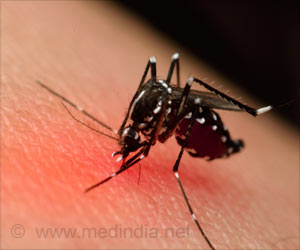- A research team from the Washington University School of Medicine have found that drug combination could be effective in chikungunya
- Anti-viral drug and drug for arthritis found to lower the swelling of joints and the number of immune cells present in the joints
- Viral load lowered during the acute phase of the disease but viral genetic material remains during the chronic phase
The symptoms of the disease, which is transmitted by mosquitoes, include rash, fever, muscle pain and fatigue with most people continuing to be affected by joint pain even after 6 months of the start of infection. In some cases, severe arthritis may continue for many years after the initial infection.
Dr. Lenschow said that there were many people who visited her clinic with symptoms that resembled rheumatoid arthritis but who were infected with chikungunya. The similarity in symptoms prompted the scientists to wonder if the drug used for rheumatoid arthritis would be effective against chikungunya arthritis.
Drugs for Rheumatoid Arthritis
Dr. Lenschow and Dr. Michael Diamond, who is the co-senior author of the study, along with colleagues tested six rheumatoid arthritis drugs, which were approved by the Food and Drug Administration. The panel of drugs was tested on mice with chikungunya arthritis.The main mechanism of action of all the six drugs was to suppress the immune system, but by following different pathways of action.
Chikungunya virus was injected into 7 groups of mice by the research team at the start of the study. After a period of three days, the mice were injected with one of the six arthritis drugs or a placebo. The research team measured
- The extent of swelling around the joints
- The numbers of molecules and immune cells that were present in the joint
- Abatacept and Tofacitinib were two of the six rheumatoid arthritis drugs that were found to significantly reduce the swelling along with a decrease in the levels of immune cells and molecules.
- The number of live viruses did not increase in the mice that were administered with any of the six rheumatoid arthritis drugs.
Administering Rheumatoid Arthritis Drug and Anti-Viral Drug
In this part of the study, the research team administered
- Abatacept- the arthritis drug
- Anti-viral drug
- Or both drugs
- Each drug reduced joint swelling independently, after a week of infection.
- The use of abatacept along with the anti-viral drug resulted in the elimination of the joint swelling and the infectious virus from the joints.
- The drug interventions were found to be useful during the acute phase of the infection but were not effective in the chronic phase.
Chronic Phase of the Disease
The chronic phase of chikungunya among humans begin three weeks after the initial infection and can last for as long as three to four years when the joint pain still exists. However, unlike in the acute phase, the virus may not be present in the blood, but the viral genetic element present could continue to trigger the immune system to cause tissue damage, manifested as arthritis.Absence of Elimination from Chronic Phase
In mice that were treated with a combination of the drugs, both anti-viral drug and drug against arthritis, the live virus was no longer found after 4 weeks of the infection. However, the viral genetic material was found in the joints, which is indicative that the drug combination did not affect the chronic phase of the disease.
The first few weeks after infection seem to be the crucial phase and the scientists believe that the administration of the drugs against arthritis could prevent the infection from entering the chronic phase. Since there is no current treatment for the joint pain associated with chikungunya, this treatment method could provide some relief. Dr. Lenschow is keen on beginning human trials in Brazil soon to determine the effectiveness of the treatment methodology.
The acute phase of the disease is characterized by high fever and joint pain, so an effective means of treatment afforded by such drug combinations would benefit patients and limit pain and discomfort, however, treatment for the chronic phase may require further studies.
References:
- Jonathan J. Miner, Lindsey E. Cook, Jun P. Hong, Amber M. Smith, Justin M. Richner, Raeann M. Shimak, Alissa R. Young, Kristen Monte, Subhajit Poddar, James E. Crowe, Jr, Deborah J. Lenschow, Michael S. Diamond. Therapy with CTLA4-Ig and an antiviral monoclonal antibody controls chikungunya virus arthritis. Science Translational Medicine, February 2017 DOI: 10.1126/scitranslmed.aah3438
- Chikungunya - (http://www.who.int/mediacentre/factsheets/fs327/en/)
















